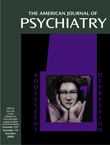Delirium With Autoimmune Thyroiditis Induced by Interferon Alpha
To the Editor: Interferon alpha (INF-α), which is antiviral, immunomodulatory, and antiproliferative, is currently used to treat carcinomas and chronic viral infections. Although it is established in the psychiatric field that INF-αoften causes a depressive state (1), a large-scale clinical study has indicated a risk of thyroid abnormalities from INF-α treatment (2). We encountered a patient who exhibited confusional delirium due to autoimmune thyroiditis after treatment with INF-α.
Ms. A, a 23-year-old woman with a 6-month history of INF-α therapy after a right nephrectomy for renal cell carcinoma, had no apparent psychiatric history. Ten days after the cessation of INF-α treatment, with confirmation that there was no recurrence of carcinoma in the abdominal region on magnetic resonance imaging, she developed delirium with a fluctuating level of consciousness and psychomotor excitement and was brought to a psychiatrist by her parents. She was immediately admitted to a psychiatric unit.
Although a brain computerized tomography scan did not reveal any signs of metastases, the results of laboratory tests showed abnormal thyroid function: a thyroid-stimulating hormone (TSH) level of 53.97 μU/ml, free triiodothyronine level of 2.24 pg/ml, free thyroxine level of 3.6 pg/ml, a positive microsomal test result of X409600, a positive antithyroid peroxidase antibody test result of 465 U/ml, and a positive antithyroglobulin antibody test result of 3.7 U/ml. There were no abnormal test results for liver and kidney function. Echo examination revealed that the size of Ms. A’s thyroid gland was within normal limits. She had not been diagnosed with thyroid dysfunction before the current admission. Thyroid hormone replacement therapy was initiated on the seventh day of admission. Her TSH level returned to normal in 3 weeks, and her delirium gradually improved with thyroid hormone replacement therapy and without the use of neuroleptics. After recovery from the episode Ms. A could recall nothing from the first 10 days of admission.
In this case the effect of INF-α itself on the central nervous system was not held responsible for the patient’s delirium because it did not appear during INF-α treatment but 10 days after treatment ceased and because thyroid hormone replacement therapy improved the patient’s symptoms. The thyroid side effect of INF-α treatment, which often requires long-term thyroid replacement therapy even after the cessation of treatment, is reported to appear frequently after 4 months of INF-α therapy because of an enhanced autoimmune mechanism (2).
Acquired hypothyroidism is reported to cause three types of psychiatric conditions that are historically categorized as myxedema madness (3): the hallucinatory-paranoid state, depression, and delirium (4). For this reason we considered the patient’s delirium to have been induced indirectly by autoimmunological processes in the thyroid gland due to repeated INF-α administration. Although immunosuppressants, including corticosteroids, cyclosporin A (5), and FK506 (6), are well known to cause delirium, the present case represents a possibility that INF-α, which is an immunoactivator, causes delirium by means of thyroid autoimmunological toxicity. Psychiatrists should consider the possible existence of a thyroid abnormality in patients with neuropsychiatric disorders induced by INF-α.
1. Adams F, Quesada JR, Gutterman JU: Neuropsychiatric manifestations of human leukocyte interferon therapy in patients with cancer. JAMA 1984; 252:938–941Crossref, Medline, Google Scholar
2. Fattovich G, Giustina G, Favarato S, Ruol A: A survey of adverse events in 11,241 patients with chronic viral hepatitis treated with alpha interferon. J Hepatol 1996; 24:38–47Crossref, Medline, Google Scholar
3. Asher R: Myxoedema madness. Br Med J 1949; 2:555–562Crossref, Medline, Google Scholar
4. Whybrow PC, Prange AJ, Treadway CR: Mental changes accompanying thyroid gland dysfunction. Arch Gen Psychiatry 1969; 20:48–63Crossref, Medline, Google Scholar
5. Guarino M, Stracciari A, Pazzaglia P, Sterzi R, Santilli I, Donato F, D’Alessandro R: Neurological complications of liver transplantation. J Neurol 1996; 243:137–142Crossref, Medline, Google Scholar
6. Wijdicks EF, Wiesner RH, Dahlke LJ, Krom RA: FK506-induced neurotoxicity in liver transplantation. Ann Neurol 1994; 35:498–501Crossref, Medline, Google Scholar



